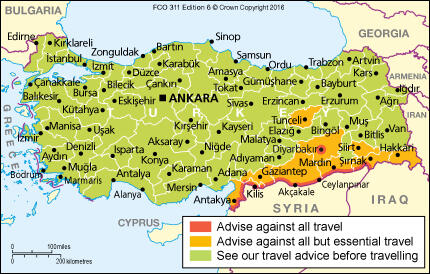Step 1
The tourism industry has been booming in Turkey, and it is likely to become an important part of its economy. The resources of the state allow for a streak of revenue obtained from tourism, which implies that a marketing strategy for promoting tourism for target customers needs to be designed. A combination of resorts and historical sites makes Turkey a very attractive tourist destination, which should be used to encourage economic growth within the state. Therefore, the mission of the project is to attract new tourists to Turkey to promote its economic development, whereas the vision involves creating an environment in which sustainable tourism can thrive in Turkey.
The inimitable combination of the ancient history and modern setting should be seen as the unique selling proposition (USP) for tourism in Turkey. The sites that the state has to offer are truly spectacular and worthy of seeing, whereas food and hotel services are modern and sophisticated. The USP in question will be used to promote tourism in Turkey. Particularly, one should consider Pamukkale as the key tourist destination due to its magnificent water terraces and historical sites, including the antique ruins of Hierapolis (Richardson, 2015).
At present, the tourist resources of the specified destination belong to the categories of Luxury, Leisure and Entertainment, and Residential ones (Management Association, Information Resources, 2017). These resources include local hotels, restaurants, sites, and entertainment, such as cinemas. Therefore, expanding the range of options for tourists to enjoy should be considered. It will be necessary to add a medical, business, and sport-related tourist resources to ensure that the quality of the services remains high.
Therefore, the services associated with transportation, food, and selling souvenirs should be seen as hard products, whereas the process of sightseeing and the services that include movies and other types of entertainment should be seen as soft ones. Thus, the types of products that will be offered to the target population will not be different from the ones that tourists can enjoy in any other tourist destination. Instead, it is the way in which tourists will experience the specified services that will define the uniqueness of the local tourism industry.
The synergy of the components will play a key part in increasing the attractiveness of this tourist destination. For instance, the inimitable flair of the ancient era and the presence of modern technology and facilities will become a crucial characteristic that will attract tourists and make Turkey look particularly interesting to the target demographic. In addition, the synergy of cultures should also become the focus of people’s attention since it will invite people to embrace the connection between multiple cultures.
Finally, the synergy between the past and the future should be seen as the synergy that will produce the greatest impact on tourists and impress them to the greatest extent. The coexistence of ancient ruins and modern technological innovations will produce a striking contrast that will astonish even seasoned travelers and ensure that they will remain entertained throughout their journey. As a result, the combination of local sights and technological advances will create the highest value and lead to a rise in the number of visits.
At present, the market segments that the project targets include people from the middle class, especially families and students. The specified demographic is most likely to be willing to combine traveling, learning, and excitement. Therefore, the combination of the selected elements will intrigue the target population and invite them to experience the surprise and wonder of the discovery of ancient cultures, at the same time maintaining the opportunity to use advanced services and comforts of the modern civilization. Moreover, the emphasis on the cultural fusion that will be observed during the tour will attract students and families as the kind of safe and fun adventure that they are most likely to enjoy.
Quality dimensions are particularly important in the plan mentioned above since the marketing campaign will place a heavy emphasis on the presence of both advanced technology and ancient culture. Therefore, the dimensions such as performance, reliability, aesthetics, perceived quality, and conformance to standards should be deemed as especially important aspects of quality management in the described scenario. By introducing the elements listed above into the setting of the tourist project mentioned above, one will ensure that customers will stay satisfied throughout their journey (Singh, Kumar, & Ray, 2016). Thus, the probability of them building loyalty toward the service and returning in the future will rise exponentially.
In addition, it is critical to building a partnership with other tourist destinations to reduce the devastating effects of rivalry and create mutual opportunities for consistent growth. At present, it is important to focus on Turkey and the local tourist destinations, yet it is also essential to expand globally in the future. For instance, it may be necessary to cooperate with tourist organizations in Ankara in order to expand the target audience and attract them to Pamukkale, which offers similar experiences regarding sites and services, yet it is considerably less known. On a global level, partnering with Malaysia is the place that is most visited by tourists.
Step 2
Becoming a component of the tourism industry and entering its market may become a problematic process due to the lack of awareness concerning the issues such as competition and demand. In addition, it is critical to building a competitive advantage that will allow a project to shine among the rest of the propositions. In the specified scenario, the competitive advantage by which the tourist destination can be characterized is quite pronounced, yet the project needs analysis of its strengths and weaknesses, as well as the challenges that it will face in the Turkish economy. Therefore, a SWOT analysis is required (see Table 1).
Table 1. SWOT Analysis.
As Table 1 shows, a strong competitive advantage and a well-developed USP are the main advantages of the project. The identified strengths need to be utilized as the key assets and explored further to increase the potential of the project. As a result, one will be able to build its credibility and customer value, thus attracting target audiences to it. At present, the project is at the earliest stage of its development since it is only planned as a concept.
The specified situation implies both significant challenges and vast opportunities (Medlik, 2016). On the one hand, the lack of experience, as well as the absence of representation in the tourism industry of Turkey are serious disadvantages, which lower the chances for success. On the other hand, the impressive competitive advantage and an inimitable UVP, which lies at the core of the project, increase the probability of gaining public attention.
Given the current state of the project, it is critical to building a set of long-term strategies for tourism planning given the existing range of assets that the project could use. For instance, the integration of technologies and the focus on the continuous improvement of services should be seen as essential elements of the planning process. However, by far the most important addition to the current framework is the focus on innovative thinking and the integration of innovations into the core of the project.
Specifically, the use of disruptive innovations will be deemed as the foundation for the development of tourism in Turkey. While the incorporation of non-incremental innovations into business is often fraught with challenges, it is critical to developing flexibility in applying new approaches. Thus, the project will utilize all available resources and will meet the demands of its market fully. Moreover, the integration of innovative thinking into the core of the project will help it to grow and adapt to market changes (Pellé, 2017). Compared to the existing competitors, which prefer to incorporate incremental innovations into their design, the current project will be capable of adjusting to rapid changes and, thus will gain an opportunity to respond to rapid changes faster.
While the project currently focuses on building a unique brand and gaining a presence in the Turkish market, it will need to enter the field of rather tight competition. Particularly, the brand will have to face rivals that feature historical tourist attractions, at the same time providing outstanding comfort and inviting tourists to feel at homes, such as Aya Sofya and Ephesus. The specified two destinations have a very similar identity and roughly the same number of resources to compete with Pamukkale (see Figure 1).

As the matrix shows, the target destination is superior to the other two, primarily due to the use of innovative approaches in providing comfort to its visitors. Moreover, the sense of authenticity, while being very difficult to recreate, is more distinct in Pamukkale than in the rest of the destinations. Thus, the probability of succeeding is comparatively higher for this project. However, the two competing destinations also have a range of advantages to offer to the tourist market of Turkey. For instance, the beautiful scenery of Aya Sofya and the historic sites of Ephesus are difficult to surpass (see Appendix A).
Each of the identified destinations has its unique charm and is known quite well, which makes the process of competing with them all the more challenging. Nevertheless, with the right marketing strategy and the appropriate allocation of resources, Pamukkale has the chance to become a popular tourist destination (Uysal, Schwartz, & Sirakaya-Turk, 2017). Thus, the project will attract a range of customers to Turkey, increasing its economic growth rates and boosting its economy.
Reference List
The British Government. (2018). Foreign travel advice: Turkey [Image]. Web.
Management Association, Information Resources. (2017). Medical tourism: Breakthroughs in research and practice. New York, NY: IGI Global.
Medlik, S. (2016). Managing tourism (2nd ed.). New York, NY: Elsevier.
Pellé, S. (2017). Business, innovation and responsibility. New York, NY: John Wiley & Sons.
Richardson, T. (2015). Pamukkale: Everything you need to know about visiting Turkey’s most popular attraction. Telegraph. Web.
Singh, P. U., Kumar, R., & Ray, N. (2016). Handbook of research on promotional strategies and consumer influence in the service sector. New York, NY: IGI Global.
Uysal, M., Schwartz, Z., & Sirakaya-Turk, E. (2017). Management science in hospitality and tourism: Theory, practice, and applications. Boca Raton, FL: CRC Press.
